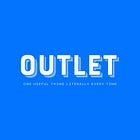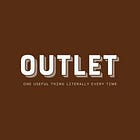12 Useful Things For 2024
Here's the full list of every useful tool, trick, exercise and advice from this year to help you work smarter and live better.
On the twelfth day of Christmas, this newsletter gives to you…a very useful recap of every one of the 12 Useful Things we’ve shared this year.
The last few weeks is always a good excuse to stop and reflect everything that’s happened over the last year. Think of it as a reminder of some of the things you did to make small or large changes to the way you work that have had small or large effects on the way you live.
If you missed this summary from last December, you can also check out last year’s list of 12 Useful Things as each of them has stood the test of time.
But before we get to this year’s round-up, I have another Christmas miracle to share with you: I’m going on a book tour around the UK in January! If you’re based there, or have colleagues, family or friends who are, I’d love to see you - or them - at one of the dates.
These lunchtime sessions (and one breakfast) will be held in London, Manchester, Birmingham and Milton Keynes as part of a partnership with the excellent co-working community x+why. These are the dates:
Birmingham on Tuesday January 7, 12:30pm: x+why Foundry
Manchester on Wednesday January 8, 12:30pm at x+why 100 Embankment
Milton Keynes on Thursday January 9, 12:30pm at x+why Unity Place
London on Tuesday January 14, 9:30am at x+why One Great Cumberland Place
London on Wednesday January 15, 12:30pm at x+why Fivefields
London on Thursday January 16, 12:30pm at x+why People’s Mission Hall
Tickets are £10 (or free for x+why members) and including a delicious lunch or breakfast. Spaces are very limited, so reserve your spot here.
Now, let’s return to all of the useful things we learnt this year, starting all the way back in January with the first OUTLET for the year:
1. Work Backwards
Can you believe it’s been twelve months since I first filled you in on the big idea that I’d been obsessing over for a few years. The way we are working is broken, and it’s up to us to fix it. We started the year with an introduction to how the work-money-life cycle needs to be reversed to life-money-work.
2. Treasure Trove of Insights
The second Useful Thing for 2024 was a kinda secret Google Drive containing hundreds of insights from some of the world’s smartest people. It doesn’t matter what industry you’re in, this folder was a crystal ball predicting almost every topic imaginable, and it’s seriously one of the most useful tools I use each year to help me process and make sense of what’s happening.
3. Job Crafting
Job crafting is a scientifically proven exercise that can help you find more meaning at work. It involves adapting and shaping your role to include more activities you find meaningful, and fewer that you don’t. Job crafting is an approach anyone can use to consciously increase the amount of meaning they get from their job - and I genuinely find myself explaining this tool to people to use at least once a week.
4. How To Fix Work
April’s Useful Thing was the first 1,100 words of my book, giving you a taste of what was inside. Since this was published I’ve now gone even further, and you can actually read the entire first chapter of the book - all 30 pages - so that as many people as possible can access to it. You can read the first chapter for free here.
5. Calendar Bankruptcy
It’s been a big year, so I don’t blame you if your diary got a bit out of hand. This month’s tool was a strategy to deal with that: by blowing it all up and declaring ‘calendar bankruptcy’, which is a simple way to clear out all the existing meetings in your diary so you can start back fresh and consciously. I heard from a lot of readers after this on how clearing it out and starting again had helped seriously them.
6. The Eisenhower Matrix
“I have two kinds of problems,” said Dwight Eisenhower, “the urgent and the important. The urgent are not important, and the important are never urgent.” That is what inspired the Eisenhower Matrix, a simple time management tool. It’s a way of categorising all of the potential things you could be spending your time on, and putting them into one of four boxes that represents how urgent or important each task is.
7. Experiments
If you want to get your boss - or anyone in your workplace, or life - to start doing things differently, there’s a really simple way of doing it in a relatively risk-free way. The trick? You need to position it as an experiment. As soon as you take away the pressure for something to solve all of our problems overnight, or be a permanent move that’s never going to go back, you are giving everyone permission to play around and test out new things.
8. Impact Statements
The idea of an Impact Statement comes from my first book, Cult Status. Every business needs an Impact Statement. If you have your own business, you definitely need one. If you work inside a bigger business, you should still have input into this for your company. But it also applies just as much to a company as it does to an individuals. You can follow this same process to create your personal Impact Statement too.
9. Segmenters vs Integrators
Knowing if you’re a segmenter or an integrator is so useful at work. Segmenters are those who can draw clear, distinct lines between their work and everything else outside it. A study from Google found that around one-third of people considered themselves segmenters. The other types of workers are integrators, who have more fluid lines between work and life. Knowledge is power, and having awareness can help you to stop beating yourself up. If you’re an integrator, you should know the good parts (flexibility) and the bad parts (overwork). If you’re a segmenter, you can better recognise the good parts (boundaries) and the bad parts (inflexibility).
10. NotebookLM
Sometimes a new technology comes along that hits you in the guts with how powerful it’s going to be over the next few years. After ChatGPT took the world by surprise two years ago, now it’s the turn of NotebookLM. This recording is two AI 'podcast hosts’ discussing my new book. It was created by simply uploading a PDF of my book into NotebookLM, then waiting a few minutes. In that time it read the entire book, pulled out the key insights and then played it back as an, admittedly, entertaining discussion between two very human-sounding robots. Actually wild, and you can use it today.
11. The 1-1-1 Simplification Method
Simplicity is often underrated, but how easy something is to communicate has a direct correlation to how far it spreads. If it takes you a few tortured minutes to describe how something works, how can you ever expect it to pass on to another person? With every big project you’re working on, you should break it down until you can describe it in 1 page, then 1 paragraph, then 1 sentence. That is the 1-1-1 method in its simplest form.
12. The Dip
The Dip is a philosophy created by Seth Godin that shows how every new project (or job, or hobby, or company) starts out fun at first, and then gets really hard, and not much fun at all. The trick is to know that you’re in The Dip, and just keep freaking going until you get to the other side. It’s a feeling familiar to everyone who’s ever tried to achieve something difficult and reached a moment when it all seems too hard.
And that’s it for the year!
Thank you so much for being an OUTLET subscriber. I love sharing useful things with you every single month, and especially love every email I’ve got back in response throughout the year.
I’m currently on my way to Oman, where we’ll spend the next few weeks exploring, diving, hiking, diving and eating our way all around the country. Then in January I’ll swap the heat for a few weeks in the UK for my book tour. I can’t wait to see some of you in person, and hope you have a brilliant break.
Until next year,
Tim













